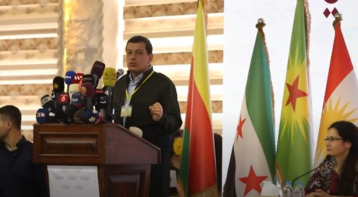-
Islamic university to be created in Latin America

The Arab News reported that Latin American Islamic associations gathered in the Brazilian city of Sao Paulo recently to sign an agreement to create the Latin American and Caribbean Islamic University.
The academic institution will allow future Muslim leaders to study in their own region, without the need to move to Middle Eastern countries and other Muslim nations.
Imams in Latin America had been discussing the idea for years. Now, Brazil’s Islamic Dissemination Center for Latin America, known by the Portuguese acronym CDIAL, and the Supreme Council of Imams and Islamic Affairs in Latin America and the Caribbean have finally made it possible.
CDIAL and the council established a deal with the Islamic University of Minnesota, which will provide academic courses and materials for the new institution.

Initially, it will have headquarters in Sao Paulo, with classes in Portuguese, and Mexico City, with classes in Spanish.
CDIAL’s Vice President Ziad Saifi told Arab News: “We’re beginning with the cities with a higher number of potential students. But our idea is that other countries create their own branches in the future."
Brazilian President taken to hospital in Sao Paulo
He said the program was inspired by traditional Islamic courses such as those offered by the Islamic University of Madinah in Saudi Arabia and Al-Azhar University in Egypt.
He added: “The university’s goal is not only to educate future sheikhs, but any person who wants to deepen his or her knowledge of Islam."
Even non-Muslim students will be able to enroll in classes, said Egyptian-born Sheikh Abdelhamid Metwally, who will be the university’s president and academic director.
58 cities in Brazil cancel Carnival 2022 celebrations for fear of COVID-19 outbreaks
He added: “We want to educate people in Islamic culture and tradition. We certainly will be able to work on the formation of sheikhs. Students who desire to pursue such a path will be able to continue their studies."
“But we also want to simply educate people on Islam. Both Muslims and non-Muslims need to have a better understanding of our religion.”
Living in Brazil for 15 years, Metwally believes it is desirable to train in Latin America religious leaders who will work in the region.
Amazon rainforest in Brazil hits highest levels of deforestation in over 15 years
That is also the opinion of Sheikh Mohamed Mansour, who will coordinate the Spanish-language courses in Mexico City.
“We need to educate people here so they can think from here. Many times, people go to the Middle East to study and when they come back, they want to impose the Middle Eastern culture in Latin America. That’s not possible,” he told Arab News.
Mansour said that Islam has been growing throughout Latin America and the Caribbean, “but we aren’t growing well if we don’t have true knowledge,” adding, “We need an academic foundation, something that goes beyond the mosques’ teaching.”
Prince Mohammed Bin Salman wants to purchase Brazilian Cruzeiro Esporte Clube
In Mexico, he explained, only Spanish can be spoken in class except for Arabic-language courses — if a professor or instructor can only speak Arabic, a translator will be present. He added: “God willing, soon we will have masters and PhD courses too."
Saifi said many sheikhs and the Muslim community as a whole have been supporting the creation of the university.
“Thankfully, people have been giving their time to this project and working on the translation of educational materials and other tasks,” he added, expressing hope that courses will begin in August.
The coordinating group is working on the university’s official accreditation in each of the region’s countries.
Report: Brazilian president should face 13 criminal charges for Covid errors
Saifi said that at first the university will operate with distance learning, given the rising number of COVID-19 cases in most Latin American countries. But a physical location is being selected in Sao Paulo.
No distinction will be made between Sunni and Shiite students, and men and women alike will be able to enroll.
Saifi expressed hope that in the future, the Brazilian branch will welcome students coming from other Portuguese-language countries such as Angola and Mozambique.
Two French youths arrested for climbing the Redeemer statue in Brazil
He said: “We still have a low number of mosques in Brazil, but their number is growing. We’ll certainly need more sheikhs and people educated on Islam."
Metwally agreed, saying: “In my own community in Sao Paulo, we have members who are already interested in enrolling. We’ll educate good Muslims.”
Source: arabnews
You May Also Like
Popular Posts
Caricature
BENEFIT Sponsors BuildHer...
- April 23, 2025
BENEFIT, the Kingdom’s innovator and leading company in Fintech and electronic financial transactions service, has sponsored the BuildHer CityHack 2025 Hackathon, a two-day event spearheaded by the College of Engineering and Technology at the Royal University for Women (RUW).
Aimed at secondary school students, the event brought together a distinguished group of academic professionals and technology experts to mentor and inspire young participants.
More than 100 high school students from across the Kingdom of Bahrain took part in the hackathon, which featured an intensive programme of training workshops and hands-on sessions. These activities were tailored to enhance participants’ critical thinking, collaborative problem-solving, and team-building capabilities, while also encouraging the development of practical and sustainable solutions to contemporary challenges using modern technological tools.
BENEFIT’s Chief Executive Mr. Abdulwahed AlJanahi, commented: “Our support for this educational hackathon reflects our long-term strategic vision to nurture the talents of emerging national youth and empower the next generation of accomplished female leaders in technology. By fostering creativity and innovation, we aim to contribute meaningfully to Bahrain’s comprehensive development goals and align with the aspirations outlined in the Kingdom’s Vision 2030—an ambition in which BENEFIT plays a central role.”
Professor Riyadh Yousif Hamzah, President of the Royal University for Women, commented: “This initiative reflects our commitment to advancing women in STEM fields. We're cultivating a generation of creative, solution-driven female leaders who will drive national development. Our partnership with BENEFIT exemplifies the powerful synergy between academia and private sector in supporting educational innovation.”
Hanan Abdulla Hasan, Senior Manager, PR & Communication at BENEFIT, said: “We are honoured to collaborate with RUW in supporting this remarkable technology-focused event. It highlights our commitment to social responsibility, and our ongoing efforts to enhance the digital and innovation capabilities of young Bahraini women and foster their ability to harness technological tools in the service of a smarter, more sustainable future.”
For his part, Dr. Humam ElAgha, Acting Dean of the College of Engineering and Technology at the University, said: “BuildHer CityHack 2025 embodies our hands-on approach to education. By tackling real-world problems through creative thinking and sustainable solutions, we're preparing women to thrive in the knowledge economy – a cornerstone of the University's vision.”
opinion
Report
ads
Newsletter
Subscribe to our mailing list to get the new updates!






















